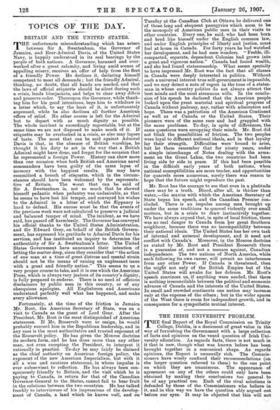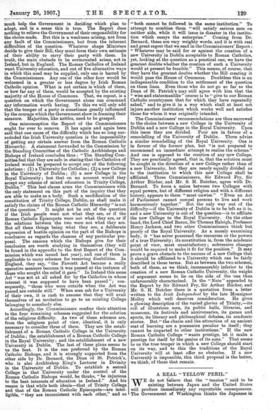THE IRISH UNIVERSITY PROBLEM.
THE final Report of the Royal Commission on Trinity College, Dublin, is a document of great value in the way of furnishing the Government with a large collection of facts and opinions on the vexed question of Irish Uni- versity education. As regards facts, there is not much in it that is new, though what was known before has been brought together in a convenient shape. As regards opinions, the Report is unusually rich. The Commis- sioners have wisely confined their recommendations (on the -larger question referred to them) to the one point on which they are unanimous. • The appearance of agreement on any of the others could only have been obtained by making their conclusions too general to be of any practical use. Each of the rival solutions is defended by those of the Commissioners who believe in it, and in this way we have the question ably argued out before our eyes. It may be objected that this will not much help the Government in deciding which plan to adopt, and in a sense this is true. The Report does nothing to relieve the Government of their responsibility for the choice made. But this is a weakness arising, not from any fault of the Commissioners, but from the inherent difficulties of the question. Whatever shape Ministers decide to give their Bill, they must form their own estimate of their ability to carry their party with them. In truth, the main obstacle to be surmounted arises, not in Ireland, but in England. The Roman Catholics of Ireland want University education, and out of five alternative ways in which this need may be supplied, only one is barred by the Commissioners. Any one of the other four would be welcomed in a greater or less degree by Irish Roman Catholic opinion. What is not certain is which of them, or how far any of them, would be accepted by the existing majority of the House of Commons. That, we repeat, is a question on which the Government alone can command any information worth having. To this we will only add that the temper of a party is sometimes greatly influenced by the courage which the Government show in framing their measure. Majorities, like nettles, need to be grasped.
One misconception the Report of the Commissioners ought for ever to remove. It has again and again been said that one cause of the difficulty which has so long sur- rodnded the Irish University question is the impossibility of getting any certain answer from the Roman Catholic Hierarchy. A statement forwarded to the Commission by the Standing Committee of the Catholic Archbishops and Bishops of Ireland concludes thus : "The Standing Com- mittee feel that they are safe in stating that the Catholics of Ireland would be prepared to accept any of the following solutions : (1) a University for Catholics ; (2) anew College in the University of Dublin ; (3) a new College in the Royal University; but that on no account would they accept any scheme of mixed education in Trinity College, Dublin." This last clause arms the Commissioners with the only statement on this part of the inquiry that they are able to make as a body. Such a modification of the constitution of Trinity College, Dublin, as shall make it satisfy the claims of the Roman Catholic Hierarchy "is out of the question." It might not be out, of the question if the Irish people were not what they, are, or if the Roman Catholic Episcopate were not what they are, or if the relations between the two were not what they are. But all these things being what they are, a deliberate expression of hostile opinion on the part of the Bishops is conclusive as regards the chances of any particular pro- posal. The reasons which the Bishops give for their conclusion are worth studying in themselves (they will be found in the appendix to the first Report of the Com- mission which was issued last year), and one of them is applicable to many schemes for removing disabilities. In England, they say, "the Fawcett Act became a really operative measure because it was passed at the instance of these who sought the relief it gave." In Ireland this same Act "was not at all asked for by the Catholics in whose interest it was supposed to have been passed "; con- sequently, "those who were outside when the Act was passed are outside still." When men ask for a University of their own, it is rash to assume that they will avail themselves of an invitation to go to an existing College belonging to somebody else.
Accordingly, the Commissioners confine their attention to the four remaining schemes suggested for the solution of the religious difficulty. As two of these schemes are, from the religious point of view, identical, it is only necessary to consider three of them. They are the estab- lishment of a Roman Catholic College in the University of Dublin ; the establishment of a Roman Catholic College in the Royal University ; and the establishment of a new University in Dublin. The last of these plans seems to us the best. It is the one preferred by the Roman Catholic Bishops, and it is strongly supported from the other side by Dr. Bernard, the Dean of St. Patrick's, who is also Archbishop King's Lecturer in Divinity in the University of Dublin. To establish a second College in that -University under the control of the Roman Catholic Bishops would, he thinks, "be injurious to the best interests of education in Ireland." And his reason is that while both ideals—that of Trinity College and that of the Roman Catholic Episcopate—are intel- ligible, "they are inconsistent with each other," and so
"both cannot be followed in the same institution." To attempt to combine them "will satisfy serious men on neither aide, while it will issue in disaster in the institu- tion which essays the enterprise." Coming from Dr. Bernard, these are very weighty words, and it is with real and great regret that we read in the Commissioners' Report : "Whatever may be said for or against the creation of a i new University n Dublin acceptable to Roman Catholics, yet, looking at the question as a practical one, we have the greatest doubts whether the creation of such a University would at present be feasible." This means, of course, that they have the greatest doubts whether the Bill creating it would pass the House of Commons. Doubtless this is an indispensable condition to the settlement of the question on these lines. Even those who do not go so far as the Dean of St. Patrick's may still agree with him that the "wise and statesmanlike" course is to " give to our Roman Catholic countrymen that for which they have repeatedly asked," and to give it in a way which shall at least not injure another institution which works well and satisfies those for whom it was originally intended.
The Commissioners' recommendations are thus narrowed to the choice between a new College in the University of Dublin and a new College in the Royal University. Upon this issue they are divided. Four are in favour of a remodelling of the University of Dublin.. Three advise a similar remodelling of the Royal University. One is in favour of the former plan, but "is not prepared to recommend an immediate attempt to realise the scheme." And one is opposed to the creation of any new College. They are practically agreed, that is, that the solution must be sought in the direction of a new College rather than of a new University, but they are nearly equally divided as to the institution to which this new College shall be affiliated. Three Commissioners, Sir Edward Fry, Sir Arthur Rucker, and Mr. S. H. Butcher, agree with Dr. Bernard. To force a union between two Colleges with equal powers, but of different religion and with a different history, appears to them "most unwise." "Even an Act of Parliament cannot compel persons to live and work harmoniously together." But the only way out of the difficulty—if the University of Dublin is to be left as it is, and a new University is out of the question—is to affiliate the new College to the Royal University. On the other hand, the Lord Chief Baron, Sir Thomas Raleigh, Professor Henry Jackson, and two other Commissioners think but poorly of the Royal University. As a merely examining body, it "has never possessed the resources or the powers of a true University; its constitution is, from the academic point of view, most unsatisfactory ; subversive changes would be required to make it fit for the position." It may prove a grave obstacle to the success of a new College that it should be affiliated to a University which can be fairly described in these terms. But as between the two schemes, both of them, as we think, immeasurably inferior to the creation of a new Roman Catholic University, the weight of argument seems to lie on the side of the 'one thus unfavourably characterised. In the "Note" appended to the Report by Sir Edward Fry, Sir Arthur Rucker, and Mr. S. H. Butcher there is a quotation from a letter written to the Irish Independent by the late Monsignor Molloy which well deserves consideration. He gives a glowing description of the varied glories of Trinity,—its roll of illustrious men, its public halls, libraries, and museums, its festivals and anniversaries, its games and sports, its literary and philosophical debates, its academic stories. But " the charm and the attraction of an ancient seat of learning are a possession peculiar to itself; they cannot be imparted to other institutions." If the new Roman Catholic College "wants prestige, let it make a prestige for itself by the genius of its sem." That seems to us the true temper in which a new College should start on its way, and to this the traditions of the Royal University will at least offer no obstacles. If a new University is impossible, this third proposal is the better, we think, of those that remain.























































 Previous page
Previous page